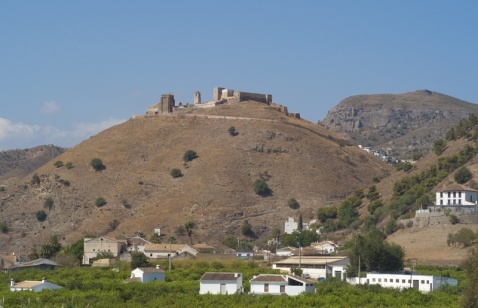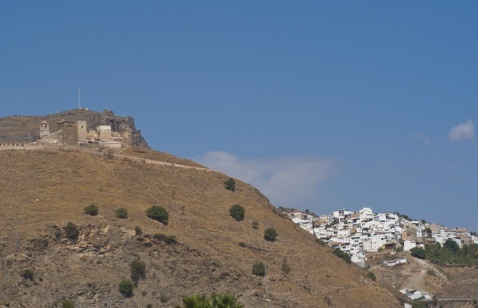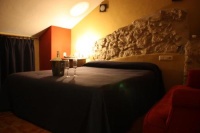
Alora, whitewashed village nestled between three rocky spurs topped by the ruins of a castle. © Michelle Chaplow |
|
Alora
by Diana Sierra
The whitewashed town of Álora lies 40 km north-west of Málaga on the old Antequera road and is bordered to the south by El Chorro. This locality has cobbled streets and a hilltop castle that hints at the town's complex and historic past. It is an ideal destination for historical and hiking tourism, and has approximately 13,500 inhabitants.
CAMINO DEL REY
The cliff hanging footpath Camino de Rey is located at El Chorro in the municipal district of Alora.
History
You can find traces of various civilisations around the town. The Castle of Álora, established by the Phoenicians, was later expanded during the Roman period and rebuilt under the Moorish period, reflecting the area's layered history.
Álora is steeped in history and culture, recognised as the birthplace of malagueñas, a type of flamenco with singing and guitar, and as the town where one of Spain’s most celebrated writers, Miguel de Cervantes, once lived. It has also welcomed other notable historical figures such as Felipe IV (King Philip IV) and El Conde-Duque de Olivares (Count-Duke of Olivares), drawn by the town’s charm and the warm character of its people.More>
Things to see
Castillo de Alora
This castle is located on a barren hilltop offering panoramic views of the surrounding Guadalhorce Valley. Built by the Phoenicians and later expanded by the Romans and Moors, this fortress played a crucial role in the defence of the Guadalhorce Valley. In 1931, it was declared a National Historic Monument. The Castle of Álora has a fortified upper enclosure with six square towers: four located at the corners and two along the northwest and southeast walls. The defensive architecture of the castle also includes remnants of surrounding walls and a horseshoe-arch gate.
La Iglesia Nuestra Señora de la Encarncación
The Church of Our Lady of the Incarnation was built in the 17th century, from 1600 to 1699, while its Baroque decoration, with paintings, altarpieces, and stuccoes, dates from the 18th century. It's the second-largest church in Malaga province, after the city.
Since the time of the Catholic Reconquest, the first parish church in Álora was built within the grounds of the Castle of Álora, on the site of the ancient mosque. Part of this Gothic building, commissioned by the Catholic Monarchs. As the population expanded beyond the castle, a new parish church was built between 1600 and 1699, now known as Our Lady of the Incarnation, which houses many works of religious art, including a wooden sculpture of Our Lady of the Flowers.
Museo Municipal Rafael Leria
The Museo Municipal Rafael Leria is housed in the Antigua Escuela de Cristo building. It is believed to have originally been the chapel of El Hospital de San Sebastián, built by the Catholic Monarchs, and is an example of 16th-century Mudejar architecture. Rafael Lería Municipal Museum displays over 200 archaeological and historical artefacts found at various sites in the surrounding area.
Outside the Village
El Convento Santuario Nuestra Señora de las Flores
The Convent Shrine of Our Lady of the Flowers is a 16th-century religious building, restored during the 18th century. It was founded at the end of the 1500s by the Franciscanos Recoletos (the austere Recollect branch of the Franciscan Order), led by Friar Diego Gómez. The community remained here until 1835, when they were expelled during the ecclesiastical confiscations of Mendizábal.
From here, visitors can enjoy panoramic views of the surrounding landscape. To the left, La Sierra de Abdalajís; opposite, the hills of Virote and El Chopo. In the distance stands the silhouette of El Torcal de Antequera, and behind, Monte Ancho, La Sierra de Aguas, and the sanctuary.
El Caminito del Rey
El Caminito del Rey (The King's Footpath) is a popular attraction, famed throughout Malaga, Spain and beyond. Once known as one of the most dangerous hikes in the world, it has been restored and now offers a safe and accessible experience for tourists, including a suspended walkway 100 metres above the gorges of Garganta del Chorro and El Desfiladero de los Gaitanes, offering breathtaking views of the Guadalhorce river below. More>
El Pantano del Chorro
The Chorro Reservoir is surrounded by limestone formations and pine woodland. It forms part of a network of lakes in the Guadalhorce river basin and is a popular destination for outdoor recreation. In the warmer months, the reservoir becomes a popular spot for swimming, canoeing, and walking along the water’s edge.
Álora - Hotels
Book hotels in Álora
Countryside Walks
Routes vary in difficulty, with some offering gentle paths through flat farmland and others a more challenging climb up into the surrounding hills for panoramic views.
Hoyo del Toril is the highest peak of La Sierra del Hacho and is located to the west of the town. This route is aimed at hikers rather than casual walkers and encircles the mountain, at the foot of which Álora spreads out like an amphitheatre. The route hugs the municipality for about 14 kilometres and takes about four hours to complete.
Gastronomy
The typical dishes of Álora are made with local products, such as olives, almonds, and citrus fruits. Sopas perotas are dishes of potato, tomato, onion, pepper and green asparagus, and day-old bread, served with seasonal fruits such as grapes, prickly pears or oranges, as well as cucumber, olive, or raw onion), salmorejo (a cream of tomatoes, stale bread, garlic, extra virgin olive oil, and salt), tortilla de espárragos verdes (green asparagus omelette), roscos de puerta horno (doughnuts) and helado de avellana (hazelnut ice cream).
There are some delicious local dishes, including sopa porota, based on a garlic broth with croutons and a revuelta of scrambled eggs with spring onions and vegetables.
Handicrafts
One of the most iconic items produced locally is castañuelas (castanets), used in performing Verdiales, traditional Málaga folk dances and songs performed in the province’s mountain villages. Other crafts include ceramics and small leather goods.
Festivals
Popular festivals in Álora are Día de La Virgen de las Flores (Virgin of the Flowers Day), Festival del Cante Grande (The Cante Grande Festival), and Cruces de Mayo (May Crosses).More>
Parking
Free public parking is available. Visitors arriving by car are advised to enter the village on the southern access road, which climbs up from the A-7077 at km 4.5. There is a large car park in Partido San José from where one can explore the village on foot.
Train service
There is a hourly local train service from Alora to centre of Malaga.More>
Bus Service
There is a bus service from Álora centre to Málaga city and Álora centre to El Chorro.More>
Tourist Office
Álora's tourist office is located next to the Town hall in the main square Plaza Fuente de Ariba. More>
Weather
The weather forecast for the next few days for Álora.More>
Next Villages
Nearby villages accessible by road include Pizarra to the south, El Chorro to the north, Carratraca and Ardales to the west.

